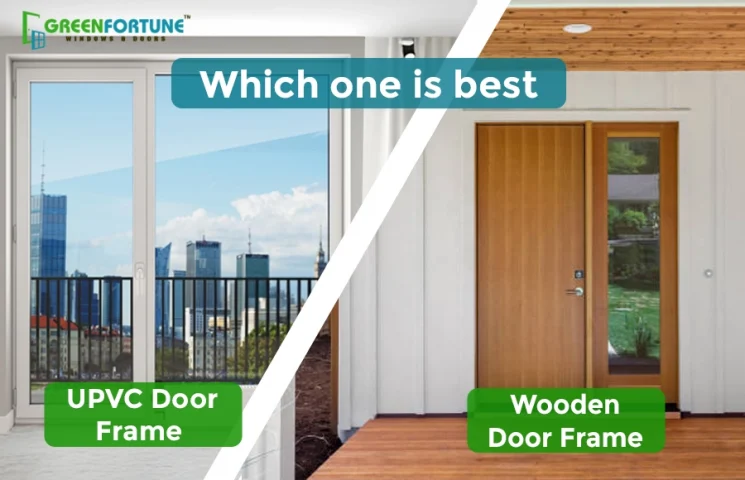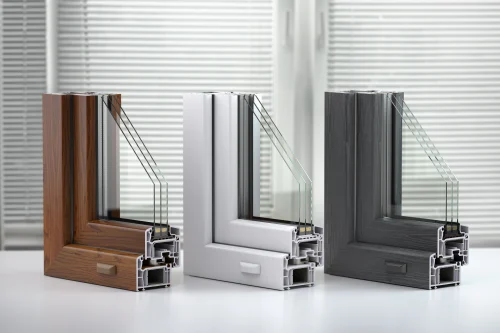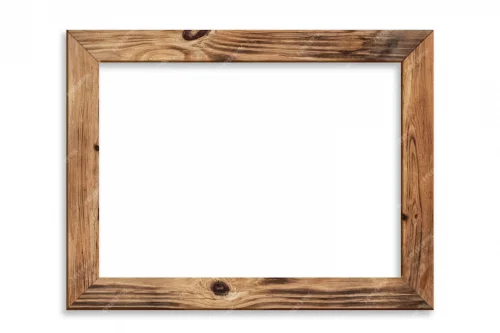
How to Select the Right Window Size Standard for Your Space
February 3, 2025
10 Stunning Blue Bathroom Tile Ideas to Transform Your Space
February 4, 2025Quick Summary:
- A uPVC frame door is made up of hard and solid materials, including PVC resin, stabilisers, and impact modifiers.
- A wooden frame door is made from solid wood extracted from trees.
- Wooden and uPVC frame doors have nearly the same lifespans, but uPVC has no maintenance costs for painting and polishing because it comes in a variety of colours and designs.
- uPVC frames can be used in a variety of areas in the home and offices as well.
Wooden frames are getting expensive and homeowners are looking for an alternative that is affordable yet durable and offers a long life span. To tackle the high cost of wooden frames, GreenFortune has come up with uPVC frames. In this guide, we will compare a uPVC frame door to a wooden frame door to help you make a decision for your home.
Understand uPVC Frame Door and Wooden Frame Door
A uPVC frame door is made of unplasticized polyvinyl chloride (uPVC), which contains stabilizers, impact modifiers, and PVC resin. All these combined make a strong yet lightweight product that comes in a variety of colours and design options, which can last up to 20 years. A uPVC frame image is added below for your reference.
Source: Freepik
On the other hand, a wooden frame door is a door frame made up of wood. Wooden frames have been widely used for a long time due to their strength and durability, but they can be affected by termites and other weather conditions. A wooden frame image is added below.
Source: Freepik
Reasons to Choose uPVC Frame Door over Wooden Frame Door
The primary reason to choose a uPVC frame door over a wooden frame door is that uPVC frame doors are low maintenance and can last up to 25 years, whereas wooden frame doors require a high maintenance cost of painting and polishing and have a life span of almost the same as uPVC. More such differences are given below:
You may like: Why Choose UPVC for Your Modular Kitchen Cabinets?
Parameter | uPVC Frame Door | Wooden Frame Door |
Durability | Highly durable and does not warp or crack. | Prone to warping, cracking, or rotting over time. |
Water Resistance | Completely water-resistant, ideal for wet areas. | Absorbs water and may swell or rot in moisture. |
Termite Resistance | Fully termite-proof, no risk of infestation. | Vulnerable to termites, requiring frequent treatment. |
Maintenance | Low maintenance, needs only occasional cleaning. | Requires regular polishing and repairs to maintain. |
Lifespan | Long-lasting with minimal wear and tear. | Shorter lifespan due to environmental damage. |
Eco-Friendliness | Made from recyclable materials, sustainable. | Requires cutting of trees, not environmentally friendly. |
Cost Over Time | Cost-effective due to low maintenance and long life. | Expensive in the long run due to maintenance and replacements. |
Applications of uPVC Frames
uPVC frames are becoming a preferred choice because of their durability and ability to handle harsh conditions. Unlike wooden frames, they require minimal maintenance and are ideal for long-term use in the following areas:
1. Main Doors
uPVC frames are sturdy and resistant to weather changes. They provide a secure and stylish option for main door entrances, lasting years without the need for regular upkeep.
2. Windows
These frames are great for windows as they block noise, water, and heat effectively. They also keep the interiors cozy and protected during extreme weather.
3. Bathroom Doors
Bathrooms need materials that can resist constant moisture exposure. uPVC frames don’t rot or swell, making them perfect for wet environments while remaining easy to clean.
4. Balcony Doors
Balconies often face direct sunlight and rain. uPVC frames can handle these conditions without warping or fading, providing a neat and modern appearance.
5. Office Partitions
uPVC frames are lightweight yet strong. They are suitable for partitions with glass, creating a professional look while offering durability and easy maintenance.
Conclusion
uPVC frames offer a reliable and practical solution for modern spaces. They are designed to last longer and reduce maintenance efforts. Whether for doors, windows, or partitions, uPVC frames provide a durable and sustainable option for every need.
Frequently Asked Questions
How long will uPVC last?
uPVC can last up to 20 to 25 years with minimal maintenance. Its durable nature makes it resistant to weather, moisture, and termites, ensuring a long lifespan for doors, windows, and other applications.
Which is best, WPC or uPVC?
Both are excellent options, but uPVC is better for doors and windows in wet areas due to its waterproof nature. WPC is ideal for interiors and furniture because of its wood-like appearance and strong build.
What are the side effects of uPVC?
uPVC is not biodegradable, which raises environmental concerns. Poor-quality uPVC may release harmful gases when burned. However, good-quality uPVC is safe and does not pose any health hazards when used correctly.
What are uPVC door frames?
uPVC door frames are made from unplasticized polyvinyl chloride. They are lightweight, durable, and resistant to water, weather, and termites. These frames are ideal for homes and offices and require very little maintenance over time.









